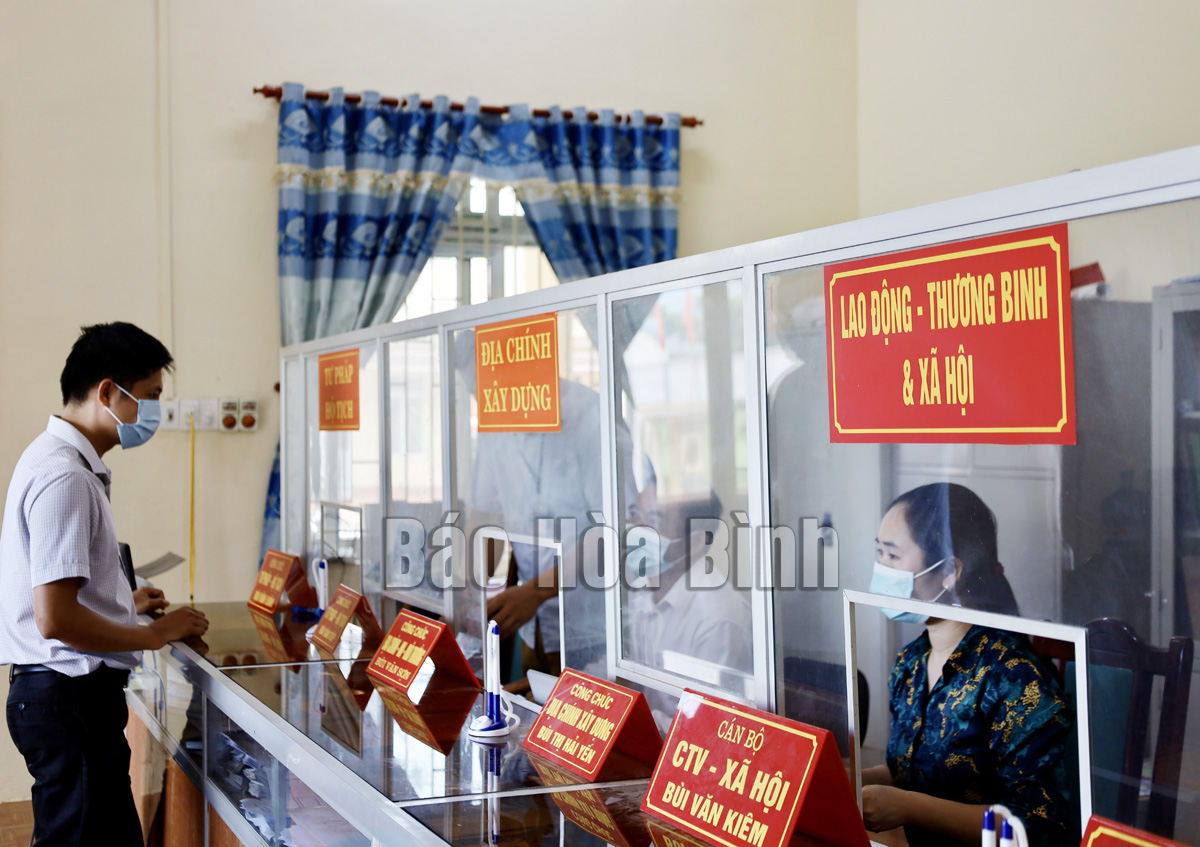
(HBO) - In addition to positive changes in personnel work in Hoa Binh province’s Lac Son district, there remains a number of shortcomings and inadequacies, such as professionalism among district officials being quite low, a lack of vision, leadership, and management skills among management officers, and commune-level officials being mostly from the grassroots level and not being trained from the very beginning, resulting in limited quality and effectiveness.

Public
servants in administrative procedures department in Yen Nghiep commune, Lac Son
district meet professional requirements and constantly improve the quality of
service.
Over the past five years, Lac Son
district has had 121 district and commune officials that hold university degrees,
39 with Master’s degrees, and 29 trained in a high level of political theory. Staff
rotation has received due attention, and personnel planning and appointments have
strictly followed regulations and processes.
The inspection, supervision, and punishment
of officials and Party members are conducted strictly, strengthening internal discipline.
Political and ideological education has been enhanced, with more training held to
disseminate guidelines from the Party as well as policies and laws.
In December 2021, the District Party
Committee issued Resolution No 09-NQ/HU, clearly defining the role of officials
as being key to all tasks. It also sets a goal of building a contingent of officials
with capacity and prestige on par with the tasks at hand and sufficient in quantity
and quality, with a structure suitable for fulfilling tasks and the socio-economic
development strategy.
In the 2021-2025 period, the district
is working to have all newly-recruited staff at the district and commune levels
possess university degrees, and all communes and towns are to have at least one
key leader who is not a local citizen.
According to Nguyen Ngoc Diep, Secretary
of the District Party Committee, in order to see a drastic change in personnel work,
the district is determined to implement the following solutions. Newly-recruited
district and commune officials must have university degrees, priority will be given
to those undertaking long-term and focused training, and staff recruitment and planning
must be in line with task requirements.
Staff evaluations must be substantive,
objective, and accurate. Staff planning is to be in line with processes and regulations.
Regular inspections and supervision will be conducted on the performance of duties
and responsibilities by officials and Party members./.
The Standing Board of the Hoa Binh provincial Party Committee has agreed in principle on a proposal by the Standing Board of the Party Committee of Hoa Binh city to gather feedback on the city’s 1:2000 zoning plan, which forms part of its broader urban development strategy.
Hoa Binh province has made notable progress in public administration reform and digital government development, with the satisfaction index among citizens and businesses reaching over 84%, according to recent government evaluations.
Thanks to great efforts by local authorities in recent times, the governance and public administration performance of Mai Chau district has been significantly improved.
In the afternoon of June 6, the Party Committee, the People's Council, the People's Committee and the Fatherland Front of Lac Son district solemnly held a meeting to celebrate the 139th anniversary of the district's founding (1886–2025) and the 79th anniversary of the establishment of the district's Party Committee (1946–2025). There was the attendance of Mr. Bui Van Thang, the Vice Chairman of the Provincial People's Council; Mr. Quach Tat Liem, the Vice Chairman of the Provincial People's Committee; Ms. Dang Bich Ngoc, the Deputy Head of the National Assembly Delegation of the province; as well as the former leaders of the province and district through various periods, who are the natives of the district.
Implementing the Politburo’s Resolution No. 57-NQ/TW on breakthroughs in science – technology, innovation, and digital transformation is a golden opportunity for the northern mountainous province of Hoa Binh to renew growth model, improve competitive edge and shorten digital gap.
Resolution 57-NQ/TW, issued by the Politburo on December 22, 2024, identifies sci-tech, innovation, and digital transformation as strategic breakthroughs to build a developed and prosperous nation. In Hoa Binh province, this spirit is not just a slogan, it’s being put into action through concrete initiatives that form a "new development triangle”: digital citizenship, digital economy, and digital administration.



